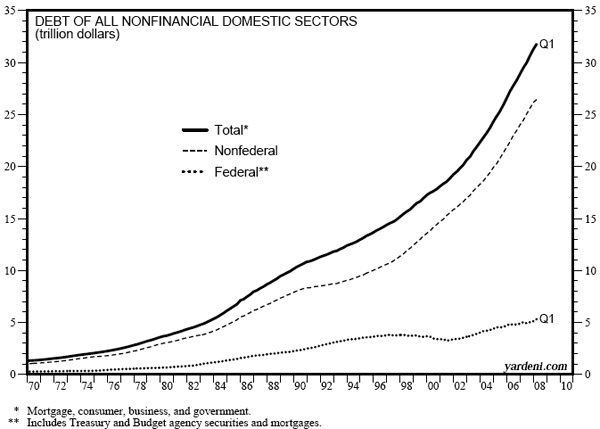 Spot The "Bubble"! Spot The "Bubble"!
Puru Saxena
Sep 26, 2008
BIG PICTURE - Let's face it, everyone uses commodities, yet natural resources are considered the underdogs within the investment world.
"They're too risky and sophisticated for a conservative investor like me" is a statement I have often heard at dinner parties. This bizarre notion is further perpetuated by the media who is quick to announce the end of the commodities 'bubble' every time tangibles undergo a normal correction. Personally, I do not really see what is so risky or sophisticated about owning oil, gas, copper, wheat or sugar. After all, every human being buys this mundane stuff on a regular basis for their very survival. So it is strange that the same people tremble at the mere thought of investing in resources.
Ironically, whereas commodities are considered hazardous to human wealth, mainstream investors are only too happy to part with their cash in exchange for 'safe' financial assets such as stocks and bonds. Those who would never dream of buying that 'risky' barrel of oil or bushel of wheat are totally at ease when investing in Citibank, Freddie Mac or Fannie Mae. All in the spirit of 'long-term investing' of course!
So, how can we explain this oddity in investor psychology? Why is it that the majority of people feel so "at home" when buying financial assets? I guess the answer to these questions comes down to familiarity and perception.
It is worth noting that between 1980 and 2000, US financial assets were in a massive bull-market. During that lengthy period, those who bought financial stocks and bonds made fortunes. More importantly, most of today's investors and money-managers grew up during a time when stocks and bonds were clearly the outperforming asset-classes. So, it should come as no surprise then that they feel more comfortable allocating money to yesterday's winners.
During the 1980's and 1990's, when US stocks and bonds were flourishing, commodities were caught in the grip of a vicious bear-market. Back then, most investors lost money in this sector and everybody knew someone who had lost their shirt investing in resources. Unsurprisingly, after two decades of losses, the investment community fell out of love with tangible assets. Needless to say, in the late 1990's, not many felt it was worthwhile to buy commodities when stocks of technology companies like Cisco Systems, Intel, Amgen or Red Hat were rocketing higher on a daily basis.
Unfortunately, the bull-market in financial assets ended in March 2000 and if it was not for the ultra-loose monetary policies of the biggest inflationist in history (Mr. Greenspan), prices of financial assets would be much lower today. So, Mr. Greenspan's money-printing efforts extended the boom in financial assets and this time around, financial stocks were the big beneficiaries. As households in the West went on a borrowing rampage, shareholders and senior management of banks and lending institutions made fortunes. There was a total disregard for risk, corporate and household balance sheets were leveraged to the hilt and money-managers were investing their vast pools of money in the red-hot homebuilding and financial stocks.
The credit bubble finally popped in August 2007 and even today, the vast majority of investors (out of habit) are desperately trying to find bargains in the beaten down financial assets. Over the past couple of months, in a highly questionable move, investors have dumped quality resource stocks in an attempt to find deeply discounted gems in the financial sector!
It is interesting to note that the majority of financial companies in the West are exposed to extreme leverage (30 to 1), have no earnings and are plagued with hidden 'Tier Three' liabilities. Yet, the mainstream financial journalists and pundits continue to tout them as screaming bargains. On the other hand, top-quality resource-producing companies with significant cash flows, reasonable valuations and record earnings are being labelled as grossly expensive bubble candidates.
I find it absurd that even though America is so over-extended (Figure 1) and most of its financial stocks have declined by at least 50% since last August, the word 'bubble' has not appeared even once in the context of financial assets! On the contrary, the ongoing pullback in resources is (yet again) being proclaimed as the end of the 'bubble'!
Figure 1: Massive debt bubble in the US!

Source: www.yardeni.com
As far as I am concerned, there is definitely a bubble in the financial markets, but it is not in commodities. Remember, investment bubbles or manias always end with excess capacity, over-supply, falling demand and euphoric investor sentiment. Well, I do not see any of these signs in the world of natural resources. On the other hand, I can observe a massive bubble in 'Over the Counter' or unregulated derivatives. Shockingly, the notional value of this market grew by a whopping 44% last year and it now stands at roughly US$600 trillion. To put this number into perspective, let me just say that it is roughly ten times the size of the global economy!
Now, it is impossible to predict when the derivatives bubble will burst, but when it does, the bang will be heard all over the world. So far in this credit crisis, only a handful of banks have gone bust. However, I suspect that dozens more will close their doors in the months ahead. Up until now, Mr. Bernanke and Mr. Paulson have managed to save some institutions at the expense of American tax payers. However, I am sure you will agree that they will not be able to save every institution in the US. Furthermore, banks in Europe are even more over-extended than their American counterparts and I doubt if the European Central Bank will come forward as the lender of last resort. So, whichever way you look at it, the outlook for the financial sector is not rosy.
Now, if the central banks decide to nationalise and bail-out all troubled institutions, the result may be hyperinflation and a further debasement of currencies. In my view, this remedy will be far worse over the long-term and the result will be much higher inflation and sky-high commodity prices. Although our clients will benefit from such an outcome, the majority of people will suffer a great deal from this disastrous scenario.
Puru Saxena
 Saxena Archives Saxena Archives
email: puru@purusaxena.com
website: www.purusaxena.com Puru Saxena publishes Money Matters, a monthly economic report, which highlights extraordinary investment opportunities in all major markets. In addition to the monthly report, subscribers also receive "Weekly Updates" covering the recent market action. Money Matters is available by subscription from www.purusaxena.com. Puru Saxena is the founder of Puru Saxena Wealth Management, his Hong Kong based firm which manages investment portfolios for individuals and corporate clients. He is a highly showcased investment manager and a regular guest on CNN, BBC World, CNBC, Bloomberg, NDTV and various radio programs. Copyright ©2005-2015 Puru Saxena Limited. All rights reserved.
Recent Gold/Silver/$$$ essays at 321gold:
Jan 28 This past week in gold Jack Chan 321gold
Jan 27 A Bull Era For The Miners Stewart Thomson 321gold
Jan 25 Aztec Minerals Scores Bonanza Gold at Tombstone Bob Moriarty 321gold
Jan 23 Gold Stocks: Untapped Upside For Investors Morris Hubbartt 321gold
Jan 23 Gold's China Takeover Adam Hamilton 321gold
Jan 20 Are Gold Targets Like $20,000 Realistic Stewart Thomson 321gold
|
321gold Ltd

|

 Spot The "Bubble"!
Spot The "Bubble"!
